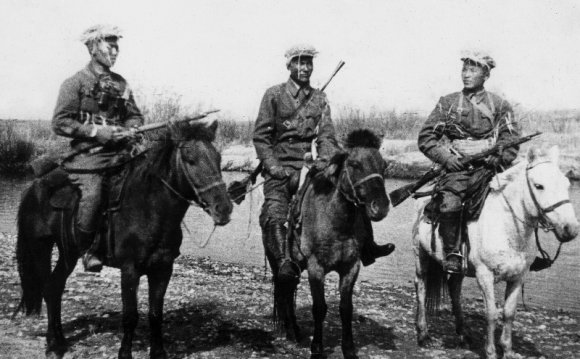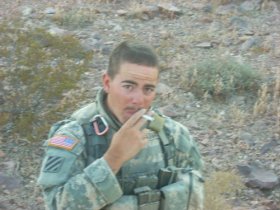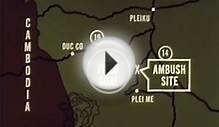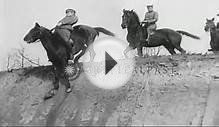
 Once again we return to our So You Want My Job series, in which we interview men who are employed in desirable jobs and ask them about the reality of their work and for advice on how men can live their dream.
Once again we return to our So You Want My Job series, in which we interview men who are employed in desirable jobs and ask them about the reality of their work and for advice on how men can live their dream.
Today we hear from one of the dedicated men serving our country in the Armed Forces. Caleb DeArmas is a Cavalry Scout in the US Army who will soon be sent back to Iraq for another tour of duty. Thank you for your service to our country, Caleb and thank for particpating in our SYWMJ series!
1. Tell us a little about yourself (Where are you from? Where did you go to school? How old are you? Describe your job and how long you’ve been at it).
My name is Caleb DeArmas. I’m 23 years old from Orlando, FL and I’m a Corporal in the United States Army.
I’ve been in the Army as a Cavalry Scout since 2006 and was sent to Iraq in 2007. I’m headed back to Iraq in about 6 weeks.
As a scout my job is to move around the battlefield to gather intelligence on all aspects of the fight in order to help the commanders build a better picture of what is happening on the ground. However, due to the dynamics of the fight in Iraq I spend most of my time fulfilling an Infantry type role. I go on patrols and raids and all the stuff you see soldiers do in the movies.
2. Why did you want to join the Army? When did you know that it was what you wanted to do?
In January of 1991 I was a 5 year old kid sitting on the floor in my living room watching Operation Desert Storm unfold every night on CNN. From that point on I never wanted to do anything else, much to my parents’ dismay.
After 9/11 my desire to join was only further fueled. I felt and still feel that as an American citizen it was my responsibility to my country to sacrifice a few years in order to defend her.
3. If man wants to become an Army Scout, how should he best prepare? How much choice does the Army give you in what kind of job you are put in?
One of the great things about the Army – the reason I chose it over other branches – is that you are guaranteed your job upon enlistment. Given you make it through Basic Training. Unfortunately, these days everyone makes it through, and it is up to the unit to weed out the ones who don’t cut it.
The best preparation for the job is rather simple. Run. Do pushups. Repeat.
Physical fitness is key to making it through Basic Training. Don’t worry though, if you want to go into the Army but can’t do any pushups, they’ll take you. And you will be able to do pushups when you’re done with Basic. Lots of ’em.
The one thing I wish I had prepared better for was the ruck marching (marching around with a 35-40 lb backpack ranging from 3k-25k). The Army understands that most guys aren’t going to walk around their neighborhoods with weighted backpacks to train, so you work your way up in distances and weights. But it is definitely something to get used to.
4. How competitive is it to get a job as an Army Scout?
As long as you score high enough on the ASVAB (the military’s version of the SAT) and you don’t have any major criminal issues in the past, it’s pretty much guaranteed – at least in title. Everyone who joins the Army to be a Cavalry Scout will go to Fort Knox, KY to train to be a Cav Scout. The real test is when you are sent to a unit. If we get a soldier who just doesn’t cut it we’ll simply get rid of him. That could mean anything from sticking him at a desk to push paperwork to kicking him out of the Army.
5. What sets a candidate apart from others when he’s applying?
Physical fitness. It’s the number one killer of soldiers across the Army. If you can’t pass a PT Test (2 minutes pushups, 2 minutes sit-ups and 2 mile run) then you’ll never make rank or be given opportunities to succeed.
6. What is the best part of the job?
There are several but my favorite would be the fact that I get paid to drive around sitting behind a .50 caliber machine gun all day. It’s almost like being in the movies.
7. What is the worst part of the job?
There are 2 major drawbacks to being a Scout. The first – it is a deadly job. It is a very real fact that when we do our job we might not make it home at the end of the day, but it is a price we are all willing to pay.
The second is the fact that I only get to do my job when I’m deployed. While in the States in between rotations to Iraq and Afghanistan, we spend a lot of time doing mundane things like working on trucks and cleaning weapons. They are very necessary things, as is all of the training we conduct in the States, but most guys will agree with me- you don’t feel like a Scout until you’re outside the wire in some far off country sitting in an OP (Observation Post) trying to catch the bad guys at work.
8. What is the biggest misconception people have about the job?
That we run around shooting and causing a ruckus all the time. Most of the time I am performing some kind of maintenance on my equipment or being so bored that I actually wish someone would try and blow me up – just to relieve the boredom.
9. What is the work/family balance like?
It depends on where you are in the deployment cycle. Immediately prior to and after deployment most commanders try and give you as much time with your family as possible, however during deployment I’ll only see my wife once for 15 days out of 12 months. During the training cycle before deployment it’s almost like a regular 9-5 unless you’re out in the field. Field problems range from overnight to 30 days.
10. What is the hierarchy like in the Army? How does one “move up” in the job?
Promotion through the early ranks is guaranteed after a certain amount of time. However a commander may deny promotion or delay it due to discipline issues or PT failure.
In order to become a Non-Commissioned Officer (NCO) you have to be selected. There is a promotion board which tests you on your job knowledge as well as overall Army knowledge. Upon passing the board everything you’ve accomplished in the Army is assigned a point value and if you have enough Promotion Points, you are promoted.
11. Any other advice, tips, or anecdotes you’d like to share?
I encourage anyone who wants to experience the Army to try it. I have only once regretted my decision (the first time my truck was blown up), and I go to work excited every day.
I haven’t updated much since the last deployment, but I try to update weekly when I’m “down range.”
If anyone wants to know how to support the guys that are already in country feel free to email me or leave a comment on my blog, and I will readily send you an address to a soldier or an organization looking for support.
INTERESTING VIDEO




 The Sacred Band of Thebes is a military unit and military organization in the Sacred Band of Stepsons universe and the Thieves' World shared fictional universe. Rescued by Tempus and his Sacred Band of Stepsons cavalry from the Battle of Chaeronea in 338 BCE...
The Sacred Band of Thebes is a military unit and military organization in the Sacred Band of Stepsons universe and the Thieves' World shared fictional universe. Rescued by Tempus and his Sacred Band of Stepsons cavalry from the Battle of Chaeronea in 338 BCE...








